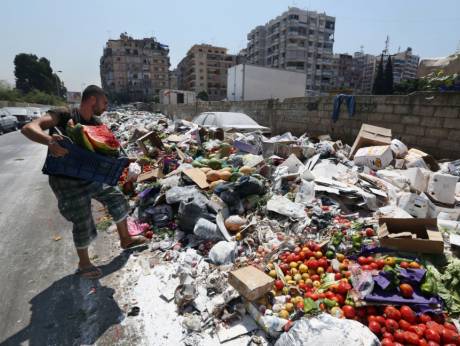
Beirut: The humid summer air of Beirut has started to reek as uncollected trash piles up in the streets after protesters shut down Lebanon’s largest landfill at a time of political paralysis.
Residents walking by the garbage spilling out of dumpsters and into the paths of passing cars lift their shirts or scarves over their noses to protect themselves from the smell.
The growing heaps have been dusted with white poison powder to keep away rats and insects, but the measure does little to combat the odour.
Ordinarily, the city’s trash is disposed of at the Naameh landfill in the mountains southeast of Beirut, the end-point for waste produced by around half of Lebanon’s four million citizens.
But for days, local villagers fed up of living next to the site have blocked entry, preventing any new trash from being dumped and insisting they will not leave until the facility is shut down for good.
“In Beirut, it’s only been four or five days of garbage and people already can’t take it. We have been dealing with Lebanon’s trash for the last 17 years,” said Yousuf Halabi, a resident of Aramoun village near the landfill.
“We can’t open our windows because of the gases coming off the dump,” the 28 year old said to nods from fellow residents at the protest tent on the road leading to the site.
“I’ve invited ministers to come to my place and see if they can tolerate it.”
Dumping grounds
The Naameh landfill opened in 1997 in a verdant valley outside Beirut.
It was meant to receive trash from the capital and the heavily populated Mount Lebanon area for only a few years until a comprehensive solution was devised.
But that plan never came to fruition, as efforts to pass waste legislation withered in Lebanon’s notoriously fractured and stagnant parliament.
As nearly 20 years ticked by, the valley that was originally expected to receive only two million tonnes of waste swelled into a trash mountain of more than 15 million tonnes.
Residents living nearby say daily life is unbearable and allege gases produced by the site cause health problems.
“This area suffers from high cancer rates, residents have incurable diseases, skin diseases, breathing problems,” said Raghida Halabi, 41, a resident of Abey, another village by the landfill.
Last year, angry locals set up a similar protest, blocking access to the landfill and prompting a trash crisis.
They ended the protest after the government pledged it would permanently close Naameh this year on July 17, but when the trash kept coming they resumed their demonstration.
“I think that our ministers and officials need to learn to respect the law and apply it,” the Abey resident said.
“All that we’re doing is enforcing it.”
To further complicate matters, Lebanon’s contract with waste management company Sukleen also expired on July 17, and the government has not indicated whether it will renew it or find a new company.
Marwan Rizkallah, a Lebanese solid waste management expert, said the Naameh crisis is symptomatic of a larger trash problem.
“The amount of waste being disposed of should be reduced,” he said.
“If plans were adopted before or if other treatment methods were adopted before, we could have dumped much less waste into that landfill.”
He said a new landfill site will be needed, but Lebanon also has to adopt recycling and better home sorting of trash so the organic matter that constitutes more than 50 per cent of its garbage can be composted.
“We cannot just create another Naameh,” he said.
Bigger problem
“We have to find another location, that is true, but as well we need to adopt different treatment technologies, we need to reduce the amount of waste generated, we need to recycle more.”
All that will require government action, which seems unlikely in the short-term, with the parliament and cabinet both politically paralysed and the presidency left vacant for over a year.
Meanwhile, Environment Minister Mohammad Mashnuq, who did not return calls for comment, has urged municipalities to dispose of trash however they can.
Residents have begun burning the expanding trash piles and there are fears garbage will be dumped in Lebanon’s hundreds of illegal dumpsites.
Despite the grim picture, Rizkallah said there could be a silver lining if the crisis encouraged Lebanese to consider the amount of waste they produce and the problems created.
“People are talking about it because they see it on the streets, and maybe this is the only positive thing.”
The crisis is front-page news in Lebanon, with Beirut residents expressing outrage online. One widely-circulated post shows Lebanon’s flag altered to show a trash bag replacing the iconic cedar tree.
“It’s raising awareness, in a very negative and bad way,” Rizkallah said. “But still, it’s raising awareness.”



